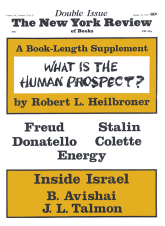(These words were read at the funeral service for Philip Rahv, held in the chapel at Brandeis University, December 24, 1973.)
I don’t know that I am the proper person to speak here at the time of the death of Philip Rahv, and I am not confident that I can speak properly. It is certainly my wish to honor in an appropriate way the man I met in 1945 and have known since without interruption. Thinking over the life and the nature of this extraordinary person, I remember that he had a large number of friends and maintained an intimacy with many of them. And yet we must respect the fact that Philip was not especially autobiographical. Of course this was something of a puzzle because his curiosity about the biography of his acquaintances was relentless, just as his refusal to accept their version of their actions and their motives was complete. Still, for himself, Philip was reserved in a genuine way and much interested in his dignity, and beyond that fanatical about standards and opinions. His life and his views were complicated; his living out of both was turbulent and serious.
He had one of the best minds of his time. Through his writing, his editing of the great magazine, Partisan Review, his insistence upon the significance of certain writers of the past and the present, through all of this he had a sharp effect upon the intellectual and cultural scene. Rahv’s passion was to judge American culture in the light of the best European tradition. He knew Russian, German, and French well, and of course was saturated in English and American cultural history.
The outstanding theme of Rahv’s efforts was, I think, a contempt for provincialism, for the tendency to inflate local and fleeting cultural accomplishments. This slashing away at low levels of taste and at small achievements passing as masterly, permanent monuments was a crusade some more bending souls might have grown weary of. But he was not ashamed of his extensive “negativism” and instead went on right up to the end scolding vanity and unworthy accommodation.
As everyone here knows, the connections between politics and high art seized and agitated Philip’s mind. Political and literary quality counted, not for reasons of personal or local pleasure, but for the honor and integrity of history itself. The European socialist intellectual tradition was strong in him and he remained a radical temperament, deeply skeptical about society’s arrangements, its classes and privileges, and its askew, self-loving justifications. True, Philip knew how to live in society, but that never obscured his hard rage at unnecessary stupidity and injustice. He did not surrender his right and his habit of suspicious scrutiny.
Rahv was horrified by the tragic world created by Stalin; Stalinism’s hatred for everything he valued caused him intense pain. But he found much pain here also: political, historical, and always the cultural miseries to be experienced from sentimentality, commercialism, and faddism. These we could say, in the colloquial sense, drove him crazy.
This was a large life, and perhaps not a particularly happy one. Everyone learned from Philip and he was indeed enormously learned in many things. About himself, he had, I suppose, arrogance, but I do not think he had much self-love and so in a way a certain joy in his own talents was denied him. He was a very fine writer, having created for himself a pure and expressive prose style in which his values and ideas came alive. His writing and his spoken presentation of his convictions were at variance in a way that always interested me. He was more reasonable and careful (not cautious) in his writing. There, on the page, the subject or the object was met as a kind of equal, even if a missionary zeal infected Philip’s wish to lead the reader toward what he thought to be correct opinion. He worked hard for coherence and substance and was dismayed by gloss and unanchored enthusiasm. Rahv’s analytical genius, his passion for literature, were an honor to his time and to those of us who cared for him.
This Issue
January 24, 1974



